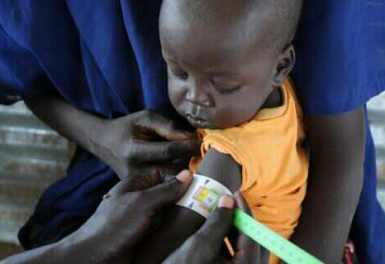Malnutrition on the rise in S. Sudan’s Pibor county: MSF
jJuly 6, 2017 (JUBA) – The number of children suffering from acute malnutrition in the areas surrounding Pibor, eastern South Sudan, has trebled in a year and is likely to continue rising, Médecins Sans Frontières (MSF) said.

MSF runs an inpatient therapeutic feeding centre in Pibor and two ambulatory feeding centres in nearby Lekongele and Gumuruk.
“In recent weeks we have treated increasing numbers of malnourished children,” explains MSF nurse Jean Soro, who manages the medical programmes in Pibor.
“In May, one of our patients in Pibor died from malnutrition and we are worried that more lives will be lost if preventive action is not taken.”
In May, MSF admitted 146 children suffering from acute malnutrition to its two clinics outside of Pibor, compared to 69 patients at the same time last year. MSF is also concerned at the high proportion of children with severe acute malnutrition. In Lekongele, 4.46 per cent of consultations are for severe acute malnutrition, while 23 per cent are for general acute malnutrition.
“A number of factors have combined to make this year’s hunger gap especially hard,” said Soro, adding that “The lack of food distribution, which in the past has helped families through these challenging months, is making matters even worse.”
Every year, Pibor experiences a peak of malnutrition during the ‘hunger gap’, which starts in April. This is the time between harvests, when food often runs scarce.
The hunger gap is taking a particularly heavy toll this year due to a combination of environmental and economic factors, the impact of the ongoing conflict and a lack of aid provision.
Irregular rains have reduced the quality and quantity of crops available. Recent clashes blocked the main supply road from the capital city, Juba, for several months, reducing the quantity of food available.
Food prices have also risen dramatically; the cost of some basic food items, such as sorghum, has quadrupled in the past three months. There is also a larger population living in the area, after people relocated from Juba to Pibor due to insecurity.
“Distributing food to the community in and around Pibor would make a huge difference in tackling acute malnutrition and avoiding unnecessary deaths,” said Jean Soro.
“There is also a real need for more health services, especially supplementary feeding programmes, targeted to vulnerable groups, including those living outside of Pibor.”
MSF is calling for other organisations working in and around Pibor to distribute food and run supplementary feeding programmes, targeted to vulnerable groups such as pregnant and breastfeeding women and children under five. Health support, it said, is also needed to reach those who are living outside of Pibor; during the rainy season, as roads become extremely difficult, reaching a health centre can become close to impossible for people living in remote areas.
“A few weeks ago, we admitted a one-year-old baby girl whose weight was only six kilos,” explains Jean Soro. “She started being sick with fever and diarrhoea, but her family lives three days’ walking distance from MSF’s clinic, so it took her some time to reach us. By the time she did, she was extremely malnourished and in a critical condition.”
(ST)
